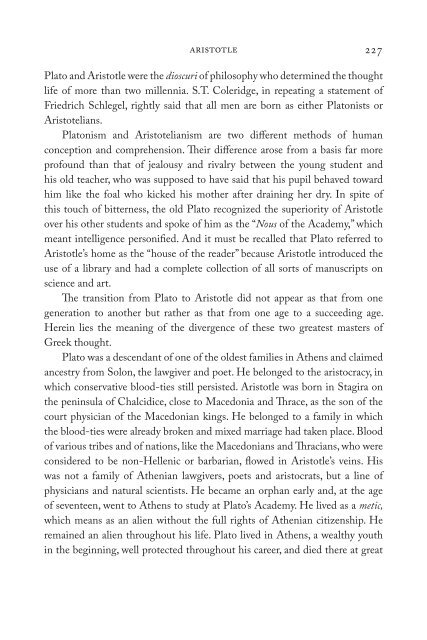The Gospel of Hellas - Research Institute for Waldorf Education
The Gospel of Hellas - Research Institute for Waldorf Education
The Gospel of Hellas - Research Institute for Waldorf Education
You also want an ePaper? Increase the reach of your titles
YUMPU automatically turns print PDFs into web optimized ePapers that Google loves.
aristotle<br />
Plato and Aristotle were the dioscuri <strong>of</strong> philosophy who determined the thought<br />
life <strong>of</strong> more than two millennia. S.T. Coleridge, in repeating a statement <strong>of</strong><br />
Friedrich Schlegel, rightly said that all men are born as either Platonists or<br />
Aristotelians.<br />
Platonism and Aristotelianism are two different methods <strong>of</strong> human<br />
conception and comprehension. <strong>The</strong>ir difference arose from a basis far more<br />
pr<strong>of</strong>ound than that <strong>of</strong> jealousy and rivalry between the young student and<br />
his old teacher, who was supposed to have said that his pupil behaved toward<br />
him like the foal who kicked his mother after draining her dry. In spite <strong>of</strong><br />
this touch <strong>of</strong> bitterness, the old Plato recognized the superiority <strong>of</strong> Aristotle<br />
over his other students and spoke <strong>of</strong> him as the “Nous <strong>of</strong> the Academy,” which<br />
meant intelligence personified. And it must be recalled that Plato referred to<br />
Aristotle’s home as the “house <strong>of</strong> the reader” because Aristotle introduced the<br />
use <strong>of</strong> a library and had a complete collection <strong>of</strong> all sorts <strong>of</strong> manuscripts on<br />
science and art.<br />
<strong>The</strong> transition from Plato to Aristotle did not appear as that from one<br />
generation to another but rather as that from one age to a succeeding age.<br />
Herein lies the meaning <strong>of</strong> the divergence <strong>of</strong> these two greatest masters <strong>of</strong><br />
Greek thought.<br />
Plato was a descendant <strong>of</strong> one <strong>of</strong> the oldest families in Athens and claimed<br />
ancestry from Solon, the lawgiver and poet. He belonged to the aristocracy, in<br />
which conservative blood-ties still persisted. Aristotle was born in Stagira on<br />
the peninsula <strong>of</strong> Chalcidice, close to Macedonia and Thrace, as the son <strong>of</strong> the<br />
court physician <strong>of</strong> the Macedonian kings. He belonged to a family in which<br />
the blood-ties were already broken and mixed marriage had taken place. Blood<br />
<strong>of</strong> various tribes and <strong>of</strong> nations, like the Macedonians and Thracians, who were<br />
considered to be non-Hellenic or barbarian, flowed in Aristotle’s veins. His<br />
was not a family <strong>of</strong> Athenian lawgivers, poets and aristocrats, but a line <strong>of</strong><br />
physicians and natural scientists. He became an orphan early and, at the age<br />
<strong>of</strong> seventeen, went to Athens to study at Plato’s Academy. He lived as a metic,<br />
which means as an alien without the full rights <strong>of</strong> Athenian citizenship. He<br />
remained an alien throughout his life. Plato lived in Athens, a wealthy youth<br />
in the beginning, well protected throughout his career, and died there at great

















